Prime Minister of Satavia: Difference between revisions
No edit summary |
|||
| Line 662: | Line 662: | ||
|- | |- | ||
|} | |} | ||
[[Category:Satavia]] | |||
Revision as of 18:28, 7 June 2023
| Prime Minister of the Satavian Federation | |
|---|---|
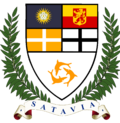 Coat of Arms of Satavia | |
 Flag of the Prime Minister of Satavia | |
| Style | the Right Honourable |
| Reports to | The President and the House of Representatives |
| Residence | The Residence, Port Hope Kingsleigh Castle |
| Appointer | President of Satavia So long as the Prime Minister commands a majority in the House of Representatives, or they have succeded a predecessor without an election |
| Term length | None On the condition that an election is held at least every four years |
| Inaugural holder | Richard Somerset, Viscount Neeves |
| Formation | October 1, 1816 |
| Deputy | Deputy Prime Minister |
| Salary | €350,000 |
| Website | www |
The Prime Minister of Satavia is the head of government of Satavia. The Prime Minister acts as head of the executive and the legislature, as per the Northabbey Model inherited from Estmere.
The post of Prime Minister was first held by Richard Somerset in 1816 after the Federation of Satavia, which saw the seven Satavian Colonies unite to become the Dominion of Satavia. Until the late 19th century, the Prime Minister was almost always a member of the upper house, the House of Peers, which included both commoners and peers, whereas the Prime Minister is now always a member of the lower house, the House of Representatives. The position of Prime Minister has existed continuously since 1816 and was the most powerful position in government through all four iterations of its existence. From 1816 until 1936, the Prime Minister was the head of government whilst the Governor-General was the King's Representative in Satavia and acted as head of state. From 1936 until 1939, as the Union of Satavia, the Prime Minister was both head of government and state, before once again reverting to its position of solely head of government in 1939. The role of the President is mostly ceremonial, making the role of the Prime Minister the most powerful in Satavia.
The longest serving Satavian Prime Minister was Johan van Vallier, Viscount Camburton who served for 24 years and 107 days, whilst the shortest serving elected Prime Minister was Jack Darling who served for 230 days, whilst the shortest serving appointed Prime Minister was Henry Parkinson who served for 70 days. The shortest serving caretaker Prime Minister was Keith Bernstein, who served for 27 days.
List
Dominion of Satavia (1816-1936)
Asterianer Nasionale Conservative Country Liberal National Union Unionist United
| No. | Portrait | Name (Birth–Death) Constituency |
Term of office | Elected (Parliament) |
Political party | Government | ||
|---|---|---|---|---|---|---|---|---|
| Took office | Left office | Time in office | ||||||
| 1 | 
|
Richard Somerset Viscount Neeves (1756-1838) Peer in the House of Peers |
1 October 1816 | 26 January 1823 | 6 years, 117 days (Served 12 years, 275 days across two terms) |
1816 (1st) | Country | Somerset I |
| from Estmere (nerd) | ||||||||
| 2 | 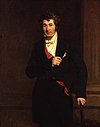
|
Pieter Dandre (1769-1833) Commoner in the House of Peers |
26 January 1823 | 15 December 1824 | 1 year, 324 days | 1823 (2nd) | Asterianer Nasionale | Dandre I |
| pretends to be satavian, actually born in and kinda from nuvania (shock, horror) | ||||||||
| (1) | 
|
Richard Somerset Viscount Neeves (1756-1838) Peer in the House of Peers |
15 December 1824 | 22 May 1831 | 6 years, 158 days (Served 12 years, 275 days across two terms) |
1824 (3rd) | Country | Somerset II |
| TBD | ||||||||
| 3 | 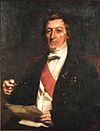
|
Patrick Conway (1779-1834) Commoner in the House of Peers |
22 May 1831 | 16 July 1834 | 3 years, 55 days | 1831 (4th) | United | Conway I |
| TBD | ||||||||
| 4 | 
|
Sir William McCrory Earl of Hodson (1782-1868) Peer in the House of Peers |
16 July 1834 | 22 August 1842 | 8 years, 37 days | 1838 (5th) | United | McCrory I |
| TBD | ||||||||
| 5 | 
|
Sir Lachlan Dachery (1790-1860) Commoner in the House of Peers |
22 August 1842 | 15 January 1845 | 2 years, 146 days | — | United | Dachery I |
| TBD | ||||||||
| 6 | 
|
Sir Thomas Macquarie (1786-1858) Commoner in the House of Peers |
15 January 1845 | 29 October 1848 | 3 years, 288 days | 1845 (6th) | Country | Macquarie I |
| TBD | ||||||||
| 7 | 
|
Daniël Pienaar (1795-1856) Commoner in the House of Peers |
29 October 1848 | 7 May 1855 | 6 years, 190 days | 1852 (7th) | Country | Pienaar I |
| first actually really satavian pm (i.e puts shrimp on bbq, really hates natives, hennish) | ||||||||
| 8 | 
|
Johan van Vallier Viscount Camburton (1812-1904) Peer in the House of Peers |
7 May 1855 | 22 August 1879 | 24 years, 107 days | 1855 (8th) 1859 (9th) 1863 (9th) 1867 (10th) 1871 (11th) 1875 (12th) |
Unionist | van Vallier I-II-III-IV-V-VI |
| TBD killed natives that kinda thing | ||||||||
| 9 | 
|
Henry Portlemouth (1834-1895) Commoner in the House of Peers |
22 August 1879 | 11 January 1881 | 1 year, 142 days | 1879 (13th) | Unionist | Portlemouth I |
| TBD | ||||||||
| 10 | 
|
Jack Darling (1829-1881) Commoner in the House of Peers |
11 January 1881 | 29 August 1881 | 230 days | 1881 (14th) | United | Darling I |
| TBD | ||||||||
| 11 | 
|
Willem Pienaar (1823-1901) Commoner in the House of Peers |
29 August 1881 | 22 August 1883 | 1 year, 358 days | — | United | Pienaar I |
| TBD killed like a ton more natives | ||||||||
| 11 | 
|
Admiral Sir Arthur O'Connell (1846-1944) MP for the Division of Grange, Hope Province |
22 August 1883 | 13 January 1901 | 17 years, 144 days | 1883 (15th) 1887 (16th) 1891 (17th) 1895 (17th) 1899 (18th) |
Conservative | O'Connell I-II-III-IV-V |
| TBD pretty cool bloke probably killed a few natives along the way ofc | ||||||||
| 12 | 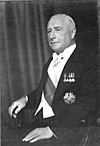
|
Henry King-Stewart Earl of Westenquay (1839-1932) Peer in the House of Peers |
13 January 1901 | 22 August 1903 | 2 years, 221 days | — | Conservative | King-Stewart I |
| TBD | ||||||||
| 13 | 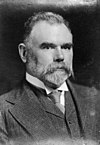
|
Liam Barrett (1861-1955) MP for the Division of Daniels, Western Free State |
22 August 1903 | 18 March 1906 | 2 years, 208 days | 1903 (19th) | United | Barrett I |
| TBD | ||||||||
| 14 | 
|
Harry Goldmann (1849-1921) MP for the Division of McKay, Hope Province |
18 March 1906 | 15 November 1906 | 242 days | March 1906 (20th) | Country | Goldmann I |
| TBD | ||||||||
| 15 | 
|
Lewis Kruger (1853-1925) MP for the Division of Killkairny, Hope Province |
15 November 1906 | 28 December 1909 | 3 years, 43 days | November 1906 (21st) | National Union | Kruger I |
| TBD | ||||||||
| 16 | 
|
Jacobus Pienaar (1856-1949) MP for the Division of Longwood, Hope Province |
28 December 1909 | 22 August 1915 | 5 years, 237 days | 1909 (22nd) 1913 (23rd) |
Liberal | Pienaar I-II |
| TBD | ||||||||
| 17 | 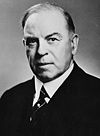
|
Sir Sydney Warwick (1866-1951) MP for the Division of Holt, Orange Province |
22 August 1915 | 22 August 1927 | 12 years | 1915 (24th) 1919 (25th) 1923 (26th) |
United | Warwick I-II-III |
| TBD bit of a chad and he didn't kill the natives so that's nice bcos there are none left to kill :( | ||||||||
| 18 | 
|
Edward Limes (1890-1941) MP for the Division of Court, Hope Province |
22 August 1927 | 23 September 1936 | 9 years, 32 days (Served 11 years, 175 days across two terms) |
1927 (27th) (Great War) 1935 (28th) |
Liberal | Edward Limes I-II-III |
| another gigachad just pretty ill most of the time | ||||||||
Union of Satavia (1936-1939)
| No. | Portrait | Name (Birth–Death) Constituency |
Term of office | Elected (Parliament) |
Political party | Government | ||
|---|---|---|---|---|---|---|---|---|
| Took office | Left office | Time in office | ||||||
| (18) | 
|
Edward Limes (1890-1941) MP for the Division of Court, Hope Province |
23 September 1936 | 13 February 1939 | 2 years, 143 days (Served 11 years, 175 days across two terms) |
1936 (29th) | Liberal | Limes IV |
| gigachad gets deposed :( | ||||||||
Republic of Satavia (1939-1976)
- Parties
National Party Nasionale Hervorming
| No. | Portrait | Name (Birth–Death) Constituency |
Term of office | Elected (Parliament) |
Political party | Government | ||
|---|---|---|---|---|---|---|---|---|
| Took office | Left office | Time in office | ||||||
| 19 | 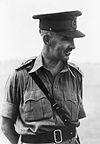
|
Field Marshal Oscar Harrision (1893-1941) — |
13 February 1939 | 28 April 1941 | 2 years, 74 days | — | National | O. Harrison |
| Harrison lead the February Coup against Edward Limes' government in 1939, and thereafter began the proccess of dismantling democracy in Satavia. Harrison was assassinated by members of the pro-democracy SRA in April 1941. | ||||||||
| 20 | 
|
Johan van Velix (1865-1941) — |
28 April 1941 | 23 December 1941 | 239 days | — | National | J. van Velix |
| Johan van Velix took power following the assasination of Field Marshall Harrison in April that year. In his eight-month stint as Prime Minister, van Velix vowed to avenge the death of Harrison and declared martial law across the country. He suffered a stroke and died later that year. | ||||||||
| 21 | 
|
General Christiaan Pienaar (1899-1972) MP for Division of Harris, Hope Province |
23 December 1941 | 17 June 1949 | 7 years, 176 days | — | National | Pienaar I-II-III |
| Pienaar, who had served as Treasurer in both Oscar Harrison and Johan van Velix's governments, took over when van Velix suffered a stroke and died in December 1941. Pienaar lead a huge crackdown on Leftists and any dissent whatsoever. Resigned in 1949 so as to replace Edward Collingham as President. | ||||||||
| 22 | 
|
Daniël Wilson (1904-2001) MP for Division of Grange Lake, Hope Province |
17 June 1949 | 3 March 1961 | 11 years, 259 days | — | National | Wilson I-II-III-IV |
| Daniël Wilson replaced Christiaan Pienaar when he stepped down to replace Collingham as President of Satavia. Wilson had served as Governor of the Hope Province in the years prior to his ascendency to the position of Prime Minister. During his tenure, Wilson further restricted civil liberties and authorised the crushing of the 1955 Satavian riots, which was condemned internationally. He stepped down in 1961, and became President two years later when Arthur Lindsey retired. | ||||||||
| 23 | 
|
Daan van Brietenbach (1907-1969) — |
3 March 1961 | 9 November 1969 | 8 years, 251 days | — | National | van Brietenbach I-II |
| Daan van Brietenbach replaced Daniël Wilson as Prime Minister in 1961. A controversial figure, he deeply divided the National Party, and his actions would ultimately lead to its demise. Ordered mass crackdowns on civil unrest and introduced various racial laws that the National Party had previously refrained from implementing. He remained as Prime Minister until his assassination by a lone gunman from one of the few remaining native tribes in Satavia whilst leaving a summit with leaders of the provincial governments. | ||||||||
| 24 | 
|
Henry Parkinson (1922-1999) — |
9 November 1969 | 18 January 1970 | 70 days | — | National | E. Malir |
| Serving as Treasurer at the time of Daan van Brietenbach's assasination, Parkinson was chosen to replace him. Parkinson proved to be weak and incapable, and was replaced by Altus Meyer after just two months. | ||||||||
| 25 | 
|
Altus Meyer (1899-1971) — |
18 January 1970 | 2 July 1971 | 1 year, 165 days | — | National | A. Meyer |
| Altus Meyer, despite being 71 and in ill health was chosen to lead the party and become Prime Minister. Two factions that had formed in the National Party could not agree on a successor so longtime party member Meyer was chosen as a compromise. Ultimately, Meyer was too ill to deal with the stress of the premiership and was incapacitated for most of his time in office. Died in office. | ||||||||
| — | 
|
Keith Bernstein (1909-1982) — |
2 July 1971 | 29 July 1971 | 27 days | — | Caretaker government | Bernstein caretaker |
| The National Party's two factions were now locked in a power struggle, and so senior civil-servant and Cabinet Secretary Kieth Bernstein was appointed to lead a caretaker administration whilst a government was formed. His administration lasted less than a month. | ||||||||
| 26 | 
|
General Hendrik Botha (1933-) — |
29 July 1971 | 27 September 1976 | 5 years, 60 days | — | Nasionale Hervorming | Botha I-II |
| Botha, who had previously been serving as Chief of the Satavian Defence Forces, was picked by the Nasionale Hervorming (National Reform) wing of the National Party as their candidate to take the premiership. Botha's National Party opponent committed suicide two days before the election, although this claim is disputed by many. Botha, under intense international pressure in the form of sanctions, began several internal reforms that saw the country open up. At odds with President Willem Pieters, who thought that this would lead to the end of National Party rule. Ultimately, with laws against protests relaxed huge demonstrations were staged in the capital, Port Hope, and across the country. Botha ordered the Hope Province Provincial Guard to crush the demonstrators in Port Hope; the Provincial Guard disobeyed his orders, and led by Johannes Klopper they seized the Parliament Buildings and residences of the President and Prime Minister, arresting Botha and ending National Party leadership. | ||||||||
Satavian Federation (1976-present)
- Parties
Conservative & Country Liberal
| No. | Portrait | Name (Birth–Death) Constituency |
Term of office | Elected (Parliament) |
Political party | Government | ||
|---|---|---|---|---|---|---|---|---|
| Took office | Left office | Time in office | ||||||
| — | 
|
Lt. Col. Johannes Klopper (1930-2009) — |
27 September 1976 | 29 November 1976 | 63 days | — | — | Klopper |
| Klopper overthrew the National Party dictatorship during the 1976 Satavian coup d'état, installing himself as temporary Prime Minister. Despite fears that Klopper would refuse to relinquish power, just two months after the coup he handed power over to Eric Edwards, Satavia's first democratically elected Prime Minister since 1936. | ||||||||
| 27 | 
|
Eric Edwards (1935-2017) MP for Division of Baxter, Hope Province |
29 November 1976 | 22 August 1984 | 7 years, 267 days | 1976 (30th) 1980 (31st) |
Liberal | Edwards I–II |
| First elected Prime Minister of Satavia since 1936. Edwards lead the campaign to defeat right-wing reactionary forces during the Satavian Crisis, and pursued closer ties with Rizealand, the NVO and the Euclean Community. Edwards won a supermajority in the 1980 federal election. | ||||||||
| 28 | 
|
Leander Kokkinakis (1951-) MP for Division of St George, Western Freestate |
22 August 1984 | 3 April 1987 | 2 years, 193 days | 1984 (32nd) | Liberal | Kokkinakis |
| Leander Kokkinakis became Satavia's youngest elected Prime Minister as well as the first Satavian Prime Minister of Piraean descent when he was elected with a supermajority in the 1984 federal election. Kokkinakis introduced a number of public welfare reforms, in addition to a system of food stamps popularly known as Kokkinakis Coupons, which remain in use across Satavia. Kokkinakis was forced to resign after the Hope Post published revelations of an affair Kokkinakis was having with a younger man. Despite the criminal status of homosexuality, Kokkinakis was never charged by police but the affair ended his political career. | ||||||||
| 29 | 
|
Maximilian Dumfries (1939-1996) MP for Division of Katter, Hope Province |
5 April 1987 | 1 December 1987 | 212 days | — | Liberal | Dumfries |
| Dumfries was elected Prime Minister by parliamentary members of the Liberal Party after a two-day period of indecision between the left-wing and centrist elements of the party. Dumrfries - a member of the extreme left of the party - soon moved to ensure stability within the party, by threatening to expel members of the centrist factions. Many MPs and Senators of the Liberal Party crossed the floor to join the Conservatives, SDP, United or became independents. Dumfries was forced to call for a general election, in wich both houses (Senate and Representatives) are dismissed, held in December 1987, which saw a resounding defeat for the Liberal party. | ||||||||
| 30 | 
|
Ben De Villiers (1946-) MP for Division of Werlaigh, New Borland |
1 December 1987 | 24 June 1994 | 6 years, 205 days | 1987 (33rd) 1990 (34th) |
Conservative & Country | De Villiers I-II |
| De Villiers was elected in a landslide as a result of the unpopularity of the Liberal party. De Villiers was the first Conservative Prime Minister since 1903 and the first Country Party Prime Minister since 1906. De Villiers launched massive spending cuts as well as a huge privatisation programme that saw several state owned enterprises, most notably Satavian Airlines, sold off or publicly floated. De Villiers called an early election in 1990, looking to capitalise off the continued instability and unpopularity of the Liberal opposition. Ultimately, De Villiers' popularity would wane as cost of living increased, and proposals made by the De Villers government to cut federal benefits saw him lose the 1994 federal election to the Liberal party. | ||||||||
| 31 | 
|
John Barrett (1958-) MP for Division of Pienaar, Hope Province |
24 June 1994 | 7 September 1996 | 2 years, 75 days | 1994 (35th) | Liberal | Barrett |
| Barrett won his electoral campaign prosper by promising huge government handouts in the wake of the ongoing Satavian cost of living crisis that disproportionately affected minorities living in Satavia. Barrett also campaigned for increased provisions of universal healthcare and fought a long and costly legal battle with the governments of the Orange Province, Western Freestate and New Borland, that argued that healthcare provisions were within the remit of the provincial governments and not the federal government. Barrett ultimately failed to deliver on his promise after the Supreme Court ruled in favour of the provincial governments, and was forced into making an embarrassing public u-turn that ultimately lost him the support of the Conservative-controlled Senate. Barrett called on the President to dismiss parliament for a general election, but his request was controversially refused by Damian de Jager, who instead called for a federal election that did not dismiss the Senate. | ||||||||
| 32 | 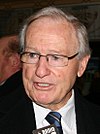
|
Rian de Klerk (1939-) MP for Division of Williams, Western Freestate |
7 September 1996 | 16 August 1998 | 1 year, 343 days | 1996 (36th) | Conservative & Country | De Klerk-Pieterson |
| Elected without a majority, De Klerk was forced to enter into a fractious coalition with the United Party's E. K. Pieterson. This coalition government proved deeply unpopular as policy clashes stunted De Klerk's agenda. The coalition's unpopularity was demonstrated by the loss of the presidency and overall control of the Senate in the 1997 senate elections. With the coaltion now unable to pass legislation through the Senate, De Klerk was forced to ask newly elected President Donald Pienaar to call for a double election. | ||||||||
| 33 | 
|
Milo Malan (1959-) MP for Division of Clarke, Groenvelde Vrystaat |
16 August 1998 | 21 July 2001 | 2 years, 339 days | 1998 (37th) | Liberal | Malan |
| Malan was elected in the narrowest margin in Satavian electoral history in a fiercely contested election against Conservative candidate Edward Norton. Despite allegations of electoral irregularities, Malan declined to launch an inquiry into the claims. Malan's premiership was tainted by persistent rumours and speculation which were outed after an investigation by the Hope Post in July 2001. Malan resigned on the seventh and was arrested by the Satavian Federal Police the following day. In 2004, he was found guily of massive electoral fraud (including ballot stuffing in several key marginal constituencies) and sentenced to nine years imprisonment. | ||||||||
| 34 | 
|
Andries Kuiper (1960-) MP for Division of Kayle, Orange Province |
21 July 2001 | 14 October 2001 | 85 days | — | Liberal | Kuiper |
| After Malan's resignation, Kuiper was appointed Prime Minister as his replacement. Kuiper was not named as guilty of electoral fraud by the Hope Post and the SFP declined to investigate Kuiper. Nonetheless, Kuiper was forced to call a federal election later that year, which saw the Liberals suffer their worst electoral defeat since Satavia's return to democracy in 1976. | ||||||||
| 35 | 
|
Edward Norton (1961-) MP for Division of Johnson, Hope Province |
14 October 2001 | 27 June 2012 | 10 years, 257 days | 2001 (38th) 2005 (39th) 2009 (40th) |
Conservative & Country | Norton I-II-III |
| Norton was elected with a landslide majority in the 2001 federal election, and perused conservative policies in his first term. However, as campaigning began for the 2005 election, Satavia was struck by the 2005 financial crash, crippling Satavia's economy. Nonetheless, the Government's rapid response saved Satavia from the worst effects being felt elsewhere internationally, and Norton remained personally popular - achieving a double majority in the 2005 election. Norton would win re-election again in 2009, based primarily upon his social and fiscally conservative policies. Norton resigned and retired from politics in 2012 after a car accident killed his wife and two young daughters, at the height of his popularity. | ||||||||
| 36 | 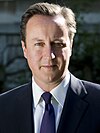
|
Jago Elliot (1973-) MP for Division of Cape Devon, Hope Province |
27 June 2012 | 9 February 2017 | 4 years, 227 days | 2013 (41st) | Conservative & Country | Elliot I-II |
| Having previously served as Treasurer under the Norton government, Elliot took victory in the Conservative & Country Party leadership spill of 2012 unopposed after Norton endorsed him. His re-election in 2013 saw a strong majority for the Conservative party. Elliot was percieved as a continuation of the Norton government and his policies closely mimicked those of Edward Norton, leading to the popularly-coined ideology of "Nortonism". In early 2017, Elliot faced an unexpected leadership challenge from within his party, lead by right-wing Deputy Prime Minister Ella Van Schalkwyk. Elliot lost the leadership election by one vote and resigned as Prime Minister. | ||||||||
| 37 | 
|
Ella van Schalkwyk (1968-) MP for Division of Marais, Orange Province |
9 February 2017 | 4 December 2017 | 298 days | — | Conservative & Country | Van Schalkwyk |
| Previously serving as Deputy Prime Minister, Ella van Schalkwyk, a member of the right wing of the Conservative & Country party, commenced a leadership spill that saw her defeat incumbent Prime Minister, Jago Elliot. She became Satavia's first female Prime Minister. Elliot's removal, although supported by the parliamentary Conservative & Country party, was deeply unpopular with the public and press. Huge negative publicity tarnished her electoral campaign and she was defeated by the Liberals, ending over fifteen years of Conservative & Country party electoral dominance. | ||||||||
| 38 | 
|
Jan McKinley (1965-) MP for Division of Cornell, Hope Province |
9 February 2017 | 22 August 2020 | 2 years, 262 days | 2017 (42nd) | Liberal | McKinley |
| Jan McKinley was elected in 2017 primarily due to public discontent at the removal of Jago Elliot by the Conservative & Country party. McKinley, ideologically part of the centrist faction within the Liberal Party, fought off constant opposition from within his party, surviving a record seven leadership spills in six months. When many of the left broke away from the Liberal Party and crossed the floor to join the minor Labour & Social Democrats, McKinley was forced to call for a general election as the Liberals had lost their majority in both houses. Ultimately, McKinley would lead his party to a wipeout in the 2020 election. | ||||||||
| 39 | 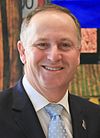
|
Arthur Warwick (1966-) MP for Division of Johnson, Hope Province |
22 August 2020 | Incumbent | 4 years, 98 days | 2020 (41st) 2022 (42nd) |
Conservative & Country | Warwick I-II |
| Warwick won a landslide election in the 2020 federal election. He perused a hardline policy on socialist states particularly Chistovodia and took a harsh stance on Chistovodia during the Arucian Sea Crisis. Continued conservative Nortonian fiscal policies but enacted a more liberal social policy. Introduced an ammendment to the Satavia Act which moved to make the Central Territory and National Capital District constitutionally and legally equal to the other provinces of Satavia. After a legal challenge to the proposed amendments, Warwick called a double election, held concurrently with a referendum, which confirmed support for the ammendment. He won re-election in the 2022 general election, but lost his majority in the Senate forcing him to enter a coalition with the United Party and appoint PK Lawson his deputy, and enter into a confidence-and-supply agreement with Satavia First. | ||||||||
